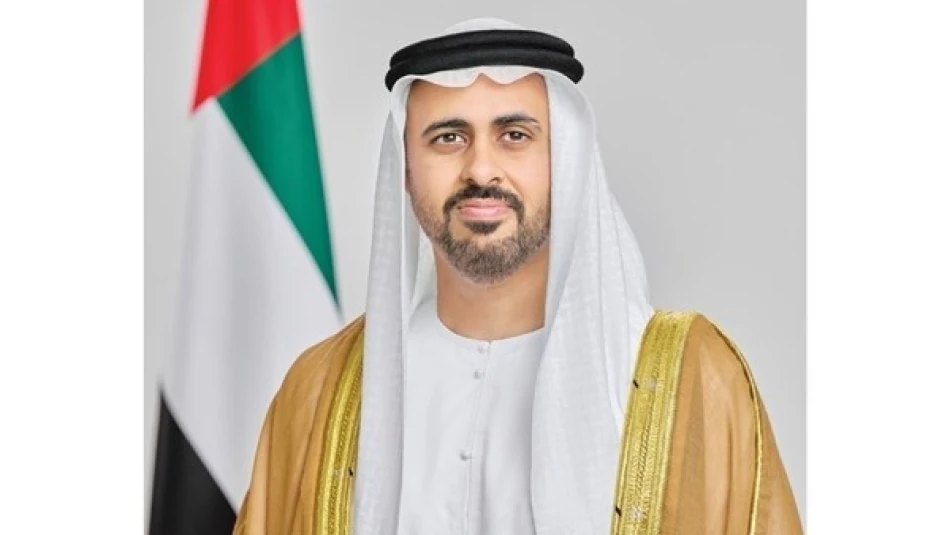
Emirati Leader Extols Philanthropic Work as a Community Value Building Human Solidarity
UAE Reinforces Global Humanitarian Leadership as Sheikh Zayed's Legacy Drives Modern Philanthropy
The United Arab Emirates continues to position itself as a global leader in humanitarian aid and charitable work, with senior leadership emphasizing how the nation's philanthropic approach stems from founding father Sheikh Zayed's vision and directly supports international stability and sustainable development goals.
Zayed's Vision Becomes State Policy
Sheikh Dhiyab bin Mohamed bin Zayed Al Nahyan, Deputy Chairman of the Presidential Court for Development Affairs and Martyrs' Families Affairs, articulated how charitable work in the UAE represents an authentic approach rooted in the legacy of the late Sheikh Zayed bin Sultan Al Nahyan. This philosophy has evolved from personal values into systematic state policy that transcends geographical and ethnic boundaries.
Speaking on the occasion of International Day of Charity on September 5th, Sheikh Dhiyab emphasized that this annual observance serves as "an important opportunity to renew commitment to the path of goodness and humanity, and enhance the spirit of giving and cooperation to support sustainable development and achieve positive humanitarian impact at all levels."
Strategic Humanitarian Diplomacy Under Current Leadership
Under President Sheikh Mohamed bin Zayed Al Nahyan's leadership, the UAE has transformed humanitarian aid into a cornerstone of its foreign policy. The nation systematically deploys charitable initiatives and activities to support populations affected by disasters, crises, wars, and conflicts worldwide.
This approach differs significantly from traditional aid models by integrating immediate disaster response with long-term development goals, creating what officials describe as a "global model" for supporting humanitarian and charitable initiatives.
Institutional Framework for Global Impact
The UAE's humanitarian efforts operate through a sophisticated institutional framework, with Sheikh Mansour bin Zayed Al Nahyan, Deputy Prime Minister and Presidential Court Chairman, overseeing the implementation of humanitarian and developmental projects for those affected by disasters and crises.
This systematic approach ensures continuity and scalability in the UAE's charitable work, moving beyond ad-hoc responses to create sustainable impact mechanisms.
Regional Context and Global Competition
The UAE's emphasis on humanitarian leadership comes as Gulf states increasingly compete for soft power influence through development aid and disaster relief. Unlike Saudi Arabia's focus on Islamic charitable organizations or Qatar's emphasis on education and sports diplomacy, the UAE has positioned itself as a secular humanitarian hub that can work across religious and cultural boundaries.
This strategy proves particularly valuable in crisis situations where political neutrality enables more effective aid delivery, as demonstrated during recent humanitarian crises in Afghanistan, Sudan, and Ukraine.
Implications for Regional Stability
Sheikh Dhiyab's comments highlight how the UAE views charitable work as directly contributing to "building a more stable, just and peaceful world." This perspective reflects a broader understanding that humanitarian aid serves strategic stability purposes beyond immediate relief.
For international partners and organizations, the UAE's systematic approach to humanitarian work offers reliable collaboration opportunities, particularly in regions where traditional Western aid faces political obstacles. The nation's ability to maintain operational presence in challenging environments makes it an increasingly valuable partner for multilateral humanitarian efforts.
The emphasis on homegrown talent working in humanitarian fields also signals the UAE's long-term commitment to building indigenous capacity rather than relying solely on international expertise, suggesting this humanitarian leadership role will likely expand rather than contract in coming years.
Most Viewed News

 Layla Al Mansoori
Layla Al Mansoori






